Ken describes reaching the city of Urumqi, at the very heart of Asia
At the heart of Asia from Ken Roberts on Vimeo.

Ken describes reaching the city of Urumqi, at the very heart of Asia
At the heart of Asia from Ken Roberts on Vimeo.
Since crossing from Kazakhstan into China, the standard of living, in general, has climbed steeply, whilst the cost of living has dropped considerably. Accommodation, food, much cheaper, the quality much higher, few exceptions. Remarkable value for money. Shades of the West, but without the price tag. For now at least.

But narrowing of the gap with the Western world extends beyond the necessities of everyday life. Issues discussed on national television, health awareness, tackling the underlying causes of juvenile crime, concerns at rapidly rising property prices in the cities, resonate closely with those you’d find being discussed in the West. And not just on China Central Television’s English language service.
Led up to the third floor by the hotel receptionist, I’d assumed I was being taken to inspect a room. But no, to the manager’s office. Exactly why was unclear at first, my phrase book, and rudimentary grasp of the language, normally sufficient – just – to secure somewhere to stay. And then I noticed the computer. They’d found a website that could translate, and one of the domestic staff spoke a little English. Able to negotiate a very favourable rate, a generously sized room to myself for roughly the cost of a Youth Hostel bed in the UK.
I’d reached the city of Urumqi, at the centre of Asia, the place furthest from any ocean on the planet. It should have been straightforward enough. I’d a map of the city centre, and, using Google Earth, had found a route through the suburbs. But then I’d discovered that my road map had confused the provincial dual carriageway with the new motorway. Forced to find a different way into the city, I’d eventually got my bearings by locating the airport, sitting on the hard shoulder watching for planes taking off.

My bicycle secured in the room, the staff had decided I needed a Chinese name. The reverse is common practice, back in Shihezi, Mao calling herself Jennifer, her son Andy, Zheng at the language school introducing himself as Mr Johnson. I was to be named Wang Jia – 王佳 in Simplified Chinese. Means family reunion, harmony, or something like that. Apparently. And extends my vocabulary to about four words. The other two are Nihow –你好– hello – and Sheshe nee –谢谢– thank you. Add lots of smiling and they go a long way.
Hmmm. Reckon about four hundred miles. I’d been consulting the map, curious as to how close I was to the Western Chinese city of Aksu. Reports on the BBC website of a bomb attack there, seven dead and fourteen injured, four seriously. But no mention on Chinese Central Television’s nightly news bulletin.
You’d be forgiven for thinking I might be leaving in fear. It’s not clear who’s behind the bombing, but, given long-standing tensions between the local Uighur people and the Han Chinese from the east of the country, it’s not difficult to see where suspicions will fall. In any case, I don’t feel like a target, not that innocence is ever a guarantee of safety. The history of human conflict shows it is the hapless by-stander who inevitably suffers the most.
But the reality is that, however tragic the events in Aksu, the situation at my present location seems very calm. In fact, if I’d not been checking my feed from the BBC website, I doubt if I’d have known about the incident. And I’ve little doubt that the Chinese authorities will deal very robustly with the situation.
If I’ve any concerns, then they’re of a strictly practical nature. Internet access, e-mail and text messaging have only recently been restored in the region, and I’d be very disappointed if today’s incident led to a fresh clamp down. But, given the lack of local news coverage, what appears to be a playing down of the bombing, I’d like to think that’s unlikely.
Still, bit of a pattern emerging here. First there was Bishkek, a few months after bloody rioting there, but that turned out to be one of the most pleasant, relaxing cities I’d visited in a while. And now western China, the city of Urumqi, also the scene of unrest last year. Today, a smart, sophisticated provincial capital, no hint of earlier events. Luck seems to be on my side. But, not wishing to tempt fate, no plans to visit North Korea any time soon.
"Never tire to study – And to teach others" – Confucious
Explaining the relationship between terms like UK, England and Britain probably wasn’t the simplest of topics to tackle, but I was pleased we’d avoided plunging further into ethnicity, my knowledge of Angles and Saxons hazy at best. I’d been invited to give a seminar at Zheng’s English language school.
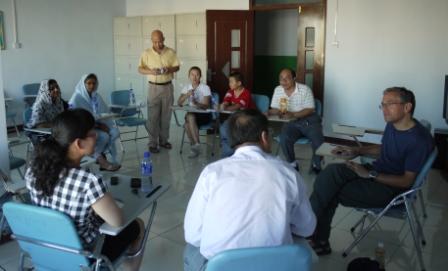
Some had studied English at University, keen to polish their skills, others still grasping the rudiments of the language. But all hugely enthusiastic. And joined by a couple of Pakistani medical students, studying in the city.
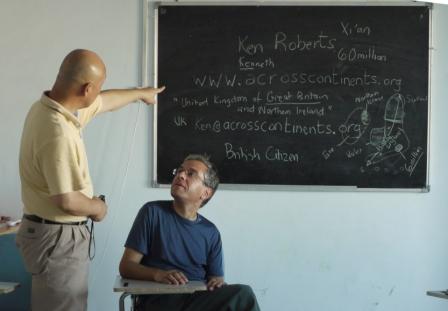
Lots of questions. Curiosity. Why had I come to China? What did I think of the country? Except for the medical students, and Zheng who’d previously worked as an interpreter, none had ever been beyond their own borders. That, I was told, was not easy to do. Red tape.
A small pavement cafe. Few hours after sunrise but already quite warm, the sun bright in my face, but not yet blinding. I’d joined Zheng and his daughter for breakfast. Steamed dumplings, some filled with soybean paste, others chopped herbs. And soybean milk. Pleasant tasting, refreshing.
I’d reached the city of Shihezi the previous evening, meeting up with Mao who’d translated my map a few days earlier. We’d been joined by Zheng. He ran a local English language school, and they’d both offered to act as guides the next day.
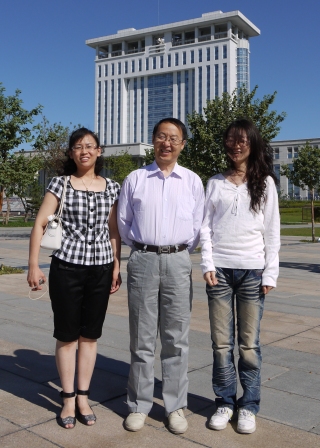
Breakfast finished, joined once more by Mao, we wandered amongst a few of the city’s parks, some of its many open spaces, along wide boulevards. Ordered. Not just a grid layout but a city with sharply defined edges. Rectangular.
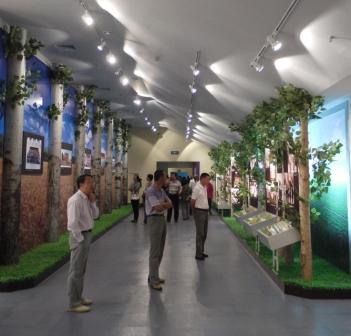
And then a visit to the local museum. Outside a nondescript municipal building. Inside the story of the city’s creation, just sixty years earlier amongst the desert sands, retold with great aplomb. Static exhibits, audio-visual presentations, of a standard more readily associated with a national institution.
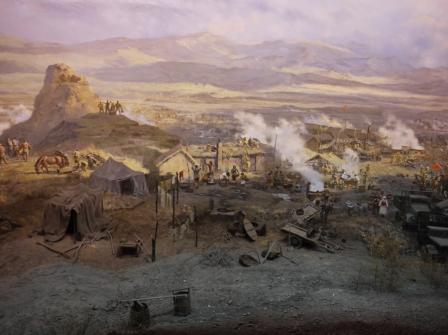
"There is a ferry across the Caspian?". I smiled. "Yes" I said, quickly adding that it took quite a bit of explaining. No timetable as such, chances are some additional fees to be paid to board. Or at least that was the case on the Azerbaijan side.
I’d been making steady progress along the dual carriageway towards Usu, a hundred miles of desert to cross, the odd small settlement. And then I’d spotted a heavily laden touring cyclist heading in the other direction. He was Japanese, a year or so younger than myself, already had South America under his belt and was heading towards Africa. We’d chatted for a while, a welcome break from riding in the searing afternoon heat. Exchanging advice, suggestions, for the road ahead. Then back to our separate ways.
I’d left the town of Jinghe earlier in the day, aiming to stop a little short of Usu, I thought to be a similarly sized place. But for toll booths, and an accompanying petrol station, every thirty or forty miles, little else. And no shade to provide even the briefest of respite.
After the chance meeting with my fellow cyclist, I’d decided to push on to Usu itself, exploiting the relative cool of the evening. And then what appeared to be a sign for the town, but far sooner than expected, and the place itself nowhere to be seen. So I’d continued on along the dual carriageway. Suddenly, there it was. A few lights now visible. But no access from my side of the road. That explained the turning miles back. So, with little other option, I’d decided to continue on to the larger town of Kuytun. Just a few miles further, but I was now very weary, and it was dark. Gone ten.
Barely perceptible. Four thousand feet of descent down pristine dual carriageway, sweeping gracefully to and fro across the ever widening valley. Lush grasslands bordering Lake Sayram Hu soon replaced by arid steppe. The sharp chill of early morning mountain air giving way to the sapping heat of the plain below.
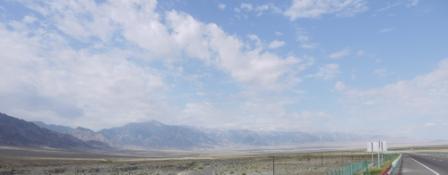
Little traffic, mostly lorries. A convoy of Polish overlanders I’d met the previous day fly past in their off road vehicles, waving enthusiastically. A few Chinese touring cyclists on the other carriageway, much less laden than my own bicycle. We scramble across the wide, rocky central reservation, exchange pleasantries, and continue on our respective ways.
Frequent signs count down kilometres remaining on the route – the G30 – in excess of four thousand. Its final destination unknown, the road signs incomprehendable. My intended night’s stop of Jinghe somewhere along the soon monotonous dual carriageway.
Sunrise at Sayham Hu from Ken Roberts on Vimeo.
Ken describes his night in a yurt, and some of the consequences of the entire country running to Beijing time.